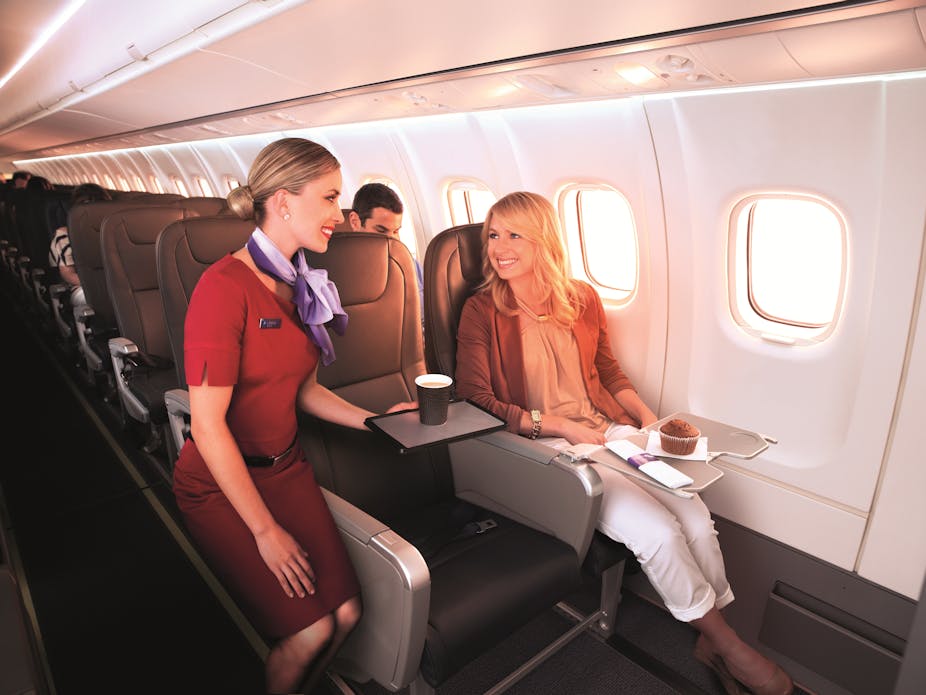Remember when airline travel was all about glamorous hostesses, dashing pilots and the stylish, well-behaved jet-set class?
No, I don’t either. But it’s a rose-tinted view of the past Virgin Australia is hoping to resurrect with its current advertising campaign. The question is, will it work?
After a tough year, Virgin Australia recently placed a double-sided wrap-around cover in one of the Sunday papers. The tag line was “the romance is back” and the images were of a smiling workforce marching forwards in a flying V formation.
In a shift from the long flowing locks of past campaigns, the young female flight attendants with their hair tied back create a streamlined, efficient outfit interrupted only by the occasional male flight attendant among the pack.
Leading the charge, as always, is the steady form of the male captain, in this instance accompanied by a female first officer. In the background, the Airbus A330 glistens with all the reassurance of modern technology.
Romance, back again? The advertisement was filmed on the salt flats of Lake Lefroy in Western Australia, and screened in time for the 2012 AFL Grand Final kick-off.
Virgin Australia CEO John Borghetti may well wish to bring back romance but he should know, more than most, there’s little romance to be had in the airline industry. It’s a tough business. And it’s a battleground out there with two airline groups with multiple brands fighting it out over multiple market segments.
Virgin Australia, by reviving the idea of romance, is attempting to take us back to the past, a past that is long gone. They are drawing on a time when passengers would put down their newspapers to stop and stare at young women as they strolled through airport terminals wearing figure-hugging suits, the half-winged badge twinkling on jacket lapels.

Today – for all airlines – the reality might go more like this: a crew worn down by the emotional labour of smiling day and night, badly behaved passengers (the gloves and hats are long gone), perpetual jet-lag. As with other shift workers, they lack the certainties of being home for birthdays, weddings and Christmas year in, year out.

The crew is window dressing parading down the aircraft aisles, in their smart, snappy, and increasingly sexy uniforms. The economic rationalists might deny the importance of symbols. Who needs window dressing when it’s the bottom line that matters?
Nostalgia can’t save an airline but Borghetti knows mixed messages and soft contradictions help punters see the airline as part of an extended national family. The message being sent by the company seems to be: “Don’t worry about the future because you can always go back to the past.”
Can a way of being in the world be brought back? In the Virgin advertisement, the only evidence to support this suggestion is exactly the same apparatus that was in place when the romance of travel was “real”.

Virgin Australia is trying to revive a time when glamorous girls in uniforms, styled to within an inch of their lives, would sit on the edge of your seat talking familiarly about exotic destinations and five-star hotels – even before they had five stars.
But it wasn’t all romance then, any more than it is now. Those glamour days the airlines try to recall for us are a mythical distortion of a time when the sky was full of unpressurised planes with no air-conditioning that risked dropping out of the skies like flies, saved only by the cavalier skills of the former air-force pilots who flew them.
It is a kind of fib that the industry is telling: “Go back to the past if you feel insecure about the future or the present.” It’s no coincidence that The Romance is Back TV advertisement has a cover of the old Ira and George Gershwin song from 1927, S’Wonderful.
The cosmopolitan mystique of the airline has long been parodied, most recently in Pedro Almodóvar’s film I’m So Excited.
In Almodóvar’s tale the “flight hostess” is replaced by three gay flight attendants who prepare a plane for a crash landing. The economy-class passengers are drugged so they are blissfully unaware of the impending disaster, while the first-class passengers and crew are out of control, fuelled up with mescaline and alcohol.
That’s not quite what Virgin Australia Chief Customer Officer Mark Hassell meant when he said the company is trying to put the “magic back into flying”.
It remains to be seen whether magic, romance and nostalgia is enough to give the firm the upper hand in Australia’s fiercely competitive airline industry.

